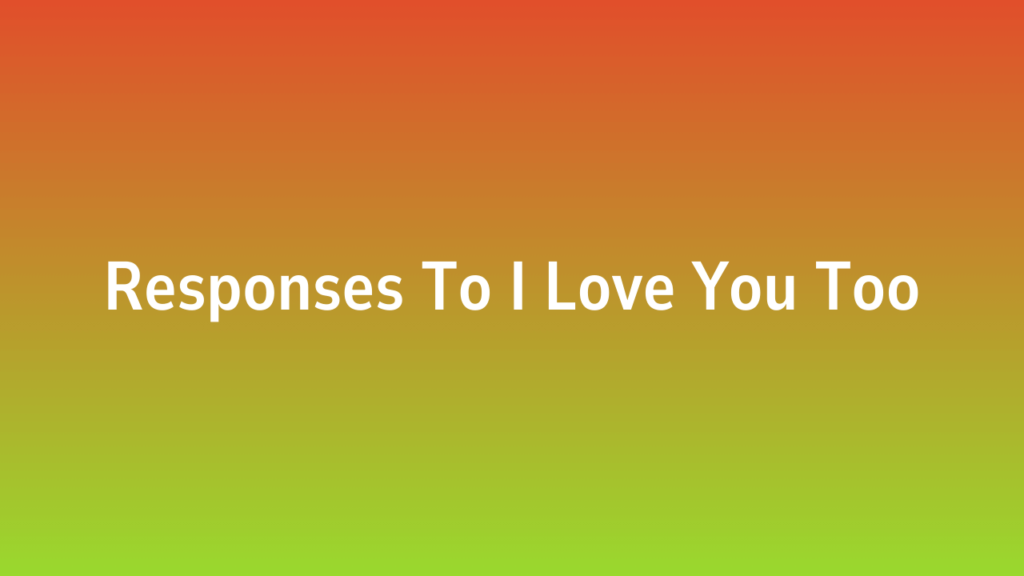When someone says “I love you,” it’s often one of the most powerful and emotional moments in a relationship. But what happens when the love is reciprocated? Saying “I love you too” can feel just as meaningful, but how you respond to that phrase can vary depending on the context of your relationship and your feelings at the time. Sometimes, saying “I love you too” is an automatic and heartfelt response, while other times, it may require a little more thought, depending on where you are in the relationship.
In this blog post, we’ll explore various ways to respond to “I love you too” with sincerity, humor, gratitude, and even creativity. Whether it’s a romantic partner, a close friend, or a family member, how you respond can influence the dynamic of your relationship, so it’s essential to approach the situation with understanding and warmth. Let’s dive into the many ways you can respond and how to navigate these moments confidently.
Why “I Love You Too” Matters
Before diving into specific responses, it’s important to recognize the significance of the phrase “I love you too.” It is an expression of mutual affection and admiration, and responding to it in a meaningful way can deepen the bond between you and the other person. Here’s why this response is so important:
- Affirming the Relationship:
- When someone says “I love you,” and you respond with “I love you too,” you’re confirming the connection and strengthening the bond. It shows you value the relationship and share the same feelings.
- Emotional Connection:
- Love is an intimate emotion, and sharing it with someone can create a deeper connection. How you respond to “I love you too” can either reinforce that connection or, if miscommunicated, create some tension.
- Encouraging Vulnerability:
- Love involves vulnerability, and by responding openly and kindly to the words “I love you too,” you show that you’re comfortable being emotionally open and genuine.
- Building Trust:
- A heartfelt response to love fosters trust. It signals that you’re emotionally present and willing to reciprocate affection in a healthy, honest way.
Understanding the emotional weight of “I love you too” can help you navigate how to respond, depending on your own feelings and the nature of the relationship.
Different Ways to Respond to “I Love You Too”
Your response to “I love you too” will depend on several factors, including the type of relationship, the level of emotional intimacy, and your personality. Below, we’ll explore various responses and when each might be most appropriate.
1. Simple and Sincere Responses
If you want to keep it straightforward and heartfelt, a simple “I love you too” is the perfect response. This response is genuine and easy to say, and it’s ideal for romantic partners or close friends and family who share mutual affection.
Examples:
- “I love you too, more than you know.”
- “I love you too. You mean the world to me.”
- “I love you too. I’m so happy we have each other.”
- “I love you too, always.”
A sincere response reassures the other person that you share their feelings and are emotionally invested in the relationship.
2. Adding a Personal Touch
Sometimes, you may want to make your response even more special by adding a personal or meaningful touch. You can mention something that’s unique to your relationship, whether it’s a shared experience, a special memory, or a heartfelt compliment.
Examples:
- “I love you too, and I’m so grateful for all the memories we’ve made together.”
- “I love you too, and every day with you feels like a new adventure.”
- “I love you too. You’re my rock, and I can’t imagine my life without you.”
- “I love you too, more than all the stars in the sky.”
Adding a personal touch makes your response feel more intimate and authentic, showing the person that you’re not just repeating words but expressing your feelings with depth.
3. Humorous Responses
If your relationship has a playful or light-hearted tone, adding humor to your response can keep things fun. Humor can defuse any tension, add joy to the moment, and keep the atmosphere relaxed.
Examples:
- “I love you too, even when you steal the covers at night.”
- “I love you too, but I’m still not sharing my fries!”
- “I love you too, but don’t expect me to do all the chores!”
- “I love you too, you’re my favorite weirdo.”
Humorous responses show that you’re comfortable being yourself around the other person and that you’re happy to share love in a fun, lighthearted way.
4. Creative or Romantic Responses
For those who want to go above and beyond in expressing their affection, adding a creative or romantic touch can make your response memorable. This is especially effective in romantic relationships where a little creativity can go a long way.
Examples:
- “I love you too, more than words could ever say.”
- “I love you too, and my heart beats only for you.”
- “I love you too, now and always, through every storm and sunny day.”
- “I love you too, and I can’t wait to spend forever with you.”
Creative responses can set the tone for an intimate moment, showing the person that you truly care and cherish them in a poetic way.
5. Gratitude-Based Responses
Sometimes, you may want to emphasize how thankful you are for the other person and the relationship. Expressing gratitude can add a layer of emotional depth to your response.
Examples:
- “I love you too, and I’m so thankful for everything you do for me.”
- “I love you too. Thank you for always being there for me.”
- “I love you too, and I appreciate you more than you know.”
- “I love you too, and I’m grateful for every moment we share.”
Gratitude-based responses highlight the value you place on the person and show that you recognize their importance in your life.
6. Responding with Future Plans or Promises
If you want to show commitment and emphasize your long-term feelings, you can respond with words that convey your plans for the future or promises of continued love and support.
Examples:
- “I love you too, and I can’t wait for all the adventures we’ll have together.”
- “I love you too, and I’ll be by your side forever.”
- “I love you too, and I’m excited for everything that’s ahead for us.”
- “I love you too, and we’re just getting started.”
By focusing on the future, you show that your love is not just a fleeting emotion but something you plan to nurture and cherish for years to come.
7. When You’re Not Ready to Say “I Love You Too”
Not everyone is at the same place emotionally when it comes to expressing love. If you’re not quite ready to reciprocate the sentiment, it’s important to be honest while still being gentle and considerate of the other person’s feelings.
Responses to Consider:
- “I really care about you, and I’m so glad we’re building this relationship.”
- “I really like you, and I’m excited to see where this goes.”
- “I care about you deeply, and I enjoy every moment we spend together.”
- “I’m so happy with how things are going, and I appreciate you so much.”
These responses show that you value the person and your relationship, even if you’re not yet ready to say “I love you too.” They are respectful and considerate, acknowledging the other person’s feelings without leading them on.
Table: Sample Responses to “I Love You Too”
| Scenario | Response Example |
|---|---|
| Simple and Sincere | “I love you too, more than you know.” |
| Adding a Personal Touch | “I love you too, and I’m so grateful for our time together.” |
| Humorous | “I love you too, even when you steal the covers!” |
| Creative or Romantic | “I love you too, my heart beats for you.” |
| Gratitude-Based | “I love you too, thank you for always being there for me.” |
| Responding with Future Plans | “I love you too, and I can’t wait for all the adventures ahead.” |
| Not Ready to Say “I Love You Too” | “I really care about you, and I’m enjoying getting to know you.” |
Conclusion: Responding to “I Love You Too” with Meaning and Heart
Responding to “I love you too” is an opportunity to express your own feelings, whether they are simple, humorous, or deeply emotional. The most important thing is to stay true to yourself and communicate your feelings authentically. Love is a unique and personal experience, and how you respond will reflect your understanding of the relationship and your emotional state.
Whether you keep it simple and sincere, add a personal touch, or respond with humor or creativity, the key is to show that you care and that you value the connection you share. By being mindful of the other person’s feelings and your own, you can navigate this moment with grace, warmth, and love.
So, the next time someone says “I love you,” remember that your response is an opportunity to reinforce your bond, deepen your relationship, and express the love you feel.



